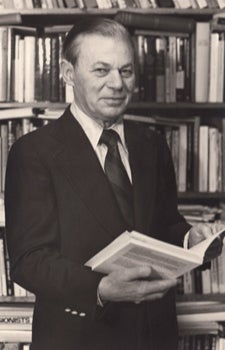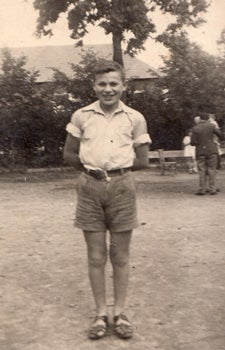In Memoriam: Moshe Lazar, 84
Moshe Lazar, professor emeritus of comparative literature and former chair, has died. He was 84.
Lazar died on December 13, 2012, at his home in Los Angeles after fighting Alzheimer’s disease for six years.
Described by those who knew him best as “a warrior scholar,” Lazar devoted his life to his “intellectual rescue mission” saving Sephardic literature and culture, including rare medieval texts in Judeo-Spanish (Ladino) — the spoken and written language developed by Spanish Jews before their expulsion from Spain in 1492.
“Moshe was one of a kind,” his wife of 41 years, Sonia Lazar, said. “He was intense, passionate, a fighter. He was a Holocaust and camp survivor and fought in three wars in Israel. I called him my soldier scholar.
“His life story was entwined with two universities: Tel Aviv and USC. He had an incredible breadth of knowledge, creativity and was a spellbinding lecturer. He did everything for the students and they sought him out and loved him.”

Lazar with part of his vast collection of rare books at home in Los Angeles in the early 1990s. Photo courtesy of Sonia Lazar.
Lazar counted among his areas of expertise courtly love, Sephardic and Hebrew literature, works in Ladino, Provençal literature, Spanish and Judeo-Spanish biblical texts, Hebrew poetry, medieval and modern drama and the paintings of Hieronymus Bosch, in addition to at least a dozen other research topics. Before he died, he was working on a major study of 1,800 years of anti-Semitic propaganda imagery.
His colleagues remember a unique personality, an enormously generous, kind, larger-than-life humanist who loved nothing more than to share his knowledge of many disciplines, including drama, which he also taught.
William Thalmann, professor and chair of the Department of Comparative Literature in USC Dornsife, paid tribute to Lazar’s “vibrant presence” and Lazer’s delight in sharing his knowledge and research with colleagues and students.
“A chance hallway conversation, on whatever Moshe happened to be thinking about, was very often an education in itself,” Thalmann said. “He was devoted to his students, and they to him. The notion of ‘office hours’ meant little in his case; his door was always open, and no matter how busy he was he always had time for his students. He was kind and considerate, and always did what people needed, whether serving on a committee, teaching a course, or helping a colleague in a less tangible way.”
Mario Saltarelli, professor of Spanish and Portuguese in USC Dornsife, called Moshe the perfect sleuth.
“He tried to collect as much as he could about Sephardic Jews, their culture and traditions, and publish it so it would be available for future generations,” Saltarelli said. “That was his mission in life.”
Three weeks before his death, Saltarelli took Lazar to the premiere of Once Upon a Time at 5th and Hoover, a documentary by one of his former students, filmmaker Andrés Enrique-Arias, about a community of Sephardim Jews who emigrated from the Greek island of Rhodes to Los Angeles in the first half of the 20th century and whose elders still speak 15th century Ladino. Enrique-Arias was able to make the documentary thanks to Lazar’s longstanding close relationship with this community, said Margaret Rosenthal, chair of USC Dornsife’s French and Italian department and professor of Italian, comparative literature and English.
“Moshe was able to communicate with Sephardic Jews, this community of people who were survivors since the Middle Ages as a man, as well as a scholar, because he was a survivor himself and he was also deeply rooted in that world through his intellectual livelihood,” Rosenthal said. “So what you have in one person is an incredible combination of someone who has lived the life of suffering of these people, but who at the same time had a very productive way of dealing with this by uncovering texts that had not been studied, by going into the world’s great libraries and finding manuscripts and trying to make sense of them.”
Born in Romania on July 4, 1928, Lazar was an infant when his family moved to Belgium. One of the rare Jews in Antwerp who was not involved in the diamond business, his father worked in the transport business. In 1940, the family and three others fled under Wermacht bombs to France in his father’s truck in an attempt to escape the advancing Nazi blitzkreig.
The family was arrested in south west France and placed in Rivesaltes, a transit camp where Lazar spent three years as a teenager awaiting deportation to Auschwitz. Lazar and his family survived World War II thanks to the French Underground which helped them escape the camp and placed the teenage boy in a Catholic school.
Even then, he showed his remarkable aptitude as a linguist by using this time in the internment camp to learn the multitude of languages spoken by prisoners in the camp. As an adult, he was fluent in 13 languages.
“I remember only a few occasions when he let me glimpse something of his past in France during and right after World War II,” said Peggy Kamuf, Marion Frances Chevalier Professor of French and professor of comparative literature and English in USC Dornsife. “It had to have been a terrifying experience for the young boy he then was, but Moshe never dwelled on past tragedy. He had an astonishingly uplifting spirit. I told him once that I wished he would write his life story. He laughed with pleasure at the idea, but I think he always preferred looking forward to his next research project.”

Lazar as a child in Europe shortly before the outbreak of World War II. Photo courtesy of Sonia Lazar.
In Catholic school, he was sent for training as an electrician, but succeeded in switching to an academic track by memorizing English and mathematics text books. Lazar struggled with poverty as he studied comparative literature at the Sorbonne in Paris, France, from 1946 to 1948. He then earned a master’s degree in French literature, romance philology and history at the Hebrew University of Jerusalem in 1951. He received a Ph.D. from the Sorbonne in 1957 after presenting his doctoral thesis on the literature of courtly love, which became a book that was compulsory reading for students of the Middle Ages.
Returning to Israel, he pursued a distinguished career both at the Hebrew University and at the University of Tel Aviv, where he overcame considerable opposition to found the School of Visual and Performing Arts and served as its first dean. His creative leadership helped inspire its graduates who went on to become Israel’s award-winning film and TV producers, artists, musicians, singers, actors, directors and playwrights.
Lazar joined USC Dornsife in 1977 as a visiting professor in the theatre department. Soon after, he joined the then-comparative literature program and served as chair in the late ’70s and early ’80s. He was named Andrew W. Mellon professor of Humanities in 1981 and served as a fellow and member of the policy committee of the USC’s Center for the Humanities. He retired in June 2011.
Lazar was close to many of Europe’s leading post-war writers, artists and musicians. He shared an apartment with writer, Holocaust survivor and Nobel Laureate Elie Wiesel in Paris for two years and counted artist Marc Chagall and playwright Eugene Ionesco as close friends. He translated Ionesco’s plays from French into Hebrew and organized conferences for him at USC and in Israel. He wrote books with Chagall and translated Chagall’s poems from Yiddish to French and English. He wrote about contemporary theatre, particularly in French, and translated numerous plays by Jean-Paul Sartre, Ugo Betti and Pedro Calderón de la Barca from French, Italian and Spanish into Hebrew for the Israeli stage.
A prolific author and scholar, Lazar published more than 50 books in various languages, including Hebrew, French, Spanish, Ladino, as well as 48 papers over the course of his academic career, producing scholarly work on medieval literature in Old French, Spanish and Provençal.
An enthusiastic bibliophile, Lazar collected tens of thousands of rare books on his worldwide travels. Over the last several years he donated more than 15,000 volumes from his own collection to enrich the USC libraries.
The Moshe Lazar Collection encompassed a wide range of titles, from French and Provençal literature to books about anti-Semitism. His generosity extended to the donation of valuable volumes, including the famous facsimile of the Alba Bible, valued at more than $50,000.
Lazar received many honors and awards during his lifetime. He received an honorary doctorate from the University of Judaism (now the American Jewish University) in 1990 and was honored by the French government with the Chevalier des Palmes Academiques for his effort in the diffusion of French literature.
In 1993, the consul general of Spain presented him with the insignia of the Orden del Mérito Civil for his efforts to save the magnificent medieval Jewish quarter of the city of Girona near Barcelona, Spain, the birthplace of the Jewish Cabbala. This remarkable neighborhood had been buried since the Spanish Inquisition and was due to be sold for development as a shopping center when an outraged Lazar inspired a group to raise the money to excavate and preserve the oldest Jewish city in Europe.
In 2003, Lazar was awarded the Raubenheimer Outstanding Senior Faculty Award by USC for excellence in the areas of teaching, research and service to the university. In 2006-2007, he received the USC Associates Award For Excellence In Teaching.
“Moshe lived and breathed his work,” Rosenthal said. “For him there was no separation between what happened in the university and what happened outside. He had enormous knowledge, he was an archaeologist of language and he imparted that huge desire to learn to his students.
“Will we find this kind of person again in future generations? It’s an enormous loss.”
Lazar is survived by his widow, Sonia, and their daughter, Ilanit.
A memorial service will be announced at a later date.